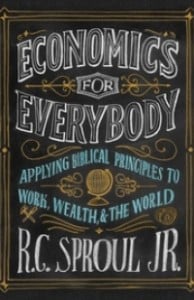An Interview with Popular Calvinist Pastor Dr. R.C. Sproul, Jr.
about his DVD series, Economics for Everybody
(Sample Clip)
The American economic turmoil of the last decade has provoked reactions from all kinds of people: academics, politicians, editorialists… and, of course, religious leaders. Among them is Dr. R. C. Sproul, Jr. He’s the son of Dr. R. C. Sproul, the prolific Calvinist theologian. R.C. Jr. is ordained into the Covenant Presbyterian Church, a denomination known, among other things, for its belief in biblical inerrancy and that God created the heavens and Earth in six days. R. C. Jr. has released a 12-part DVD series with a very broad title: Economics for Everybody.
By the end of this interview, R. C. Jr. whittles down what kind of economics, who precisely is everybody, and what his goal is in re-teaching a subject that pretty much all Americans can get at their local community college. Our talk raises some interesting questions about ways clerics try to use their craft to influence their audience’s views — and behavior — regarding wealth and related public policy.
The DVD set comes with a Study Guide and is meant to be used in by churches, families, and individuals. In the video, R.C. Jr.’s peppy style of teaching is mixed together with funny animations and historical clips. He presents a synopsis of economic theory that he says is based on Biblical principles. R.C. Jr. teaches that God created economics for humans to carry out what is sometimes called the “cultural mandate” — that is, Genesis 1:28:
Be fruitful and multiply, and fill the earth and subdue it; and have dominion over the fish of the sea and over the birds of the air and over every living thing that moves upon the earth.
He instructs us that economics “is deduced from certain assumptions just like geometry,” and that God created these laws. They lead R.C. Jr. to very clear conclusions. Here are a few examples:
- that family and church are “the realms decreed by God” to take care of social needs like education and helping the poor
- “the real reason for government intervention is always social and/or economic control; someone or some group is trying to control the economy for their own economic or social ends”
- “If someone is in poverty because of his sin, and charity comes without the gospel message and a call to repentance, then the real reason for his poverty is never addressed.”
R.C. Jr.’s overarching practical advice is that people should advocate for what he calls Christian economic principles — those being, that the government would ideally play no role, in an economy, beyond protecting “life and private property”. This includes abolition of the income tax, public schools, and government welfare programs.
R.C. Jr. was kind enough to speak to me about his DVD series. I started our interview by asking him a question that he himself suggested.
$ ☭ $ ☭ $
Who’s the target audience of Economics for Everybody? Can you be more specific, than, “everybody”?
It’s for everybody who hasn’t already seen it. How’s that? [laughs]
It’s for everybody who wants to understand what the Bible has to say about economic enterprise — we have something to speak into that conversation with this series.
My dad’s a professor of economics. Is it for him, too?
Certainly, absolutely. Economics is known as the “dismal science”. Someone once quipped that if you would take all the economists, including your dad, and laid them end-to-end, they still wouldn’t reach a conclusion. We don’t want to take the position that once you’ve obtained a certain level of specialized knowledge that you’re beyond the conversation. Certainly there are things we can still learn, and we can speak with those who are well-trained. That said, obviously your father and economic professors probably have more basic fundamental knowledge than your average Joe. And so this is really designed for people who are frightened by economics, who are confused by economics, but who can at least realize that it’s something important to understand.
One of the notions in this DVD series is that socialism can develop incrementally. You call it evolutionary socialism, as opposed to revolutionary socialism.
Absolutely. There are those who would advocate for what they call a third way, or a middle way, a sort of controlled economy. We can go back and forth on the pendulum on those kinds of issues. I remember in my own lifetime, whole huge swaths of the economy were socialized in England. The entire coal industry was nationalized. The entire airline industry was nationalized. And I believe it was under Margaret Thatcher that those nationally-held-and-administered-by-the-state enterprises were set free. In the same way, one could argue that we have already socialized education in this country. Everybody who owns land is taxed in order to provide the service for all who would want education for free, in the public school system, and we’re getting very close to expanding socialistic health care programs that exist already for those who are older, in Medicare, to include everybody.
So is part of the purpose of this series to educate people, in your view, to prevent evolutionary socialism?
Absolutely. We’re trying to push that pendulum the other way. We’re persuaded that while the Bible may certainly leave room for people to voluntarily share things with others, the Bible does not leave room for the state to take the wealth earned by individuals, put it in all a pot, divide it up and give it out to everybody. And neither is it healthy for anybody: not the recipient, not the one who’s taxed, and not anybody else who’s untouched directly, because it does damage to our ability to fulfill the dominion mandate.
Without giving away the whole plot, can you in, say, a paragraph, walk us through the story of economics as God created it?
 Economics is the fulfillment of God’s demand to man in the garden to steward his creation — to take the dirt that God made, and turn it into things that are useful, beautiful, and/or provide for our needs. In fulfilling the mandate, we are reflecting the glory of God, manifested in his creation, by taking things that are unfinished — raw materials — and turning them into finished things. Economics answers this question: how it is that God has designed things for us to be able to receive from him our daily bread?
Economics is the fulfillment of God’s demand to man in the garden to steward his creation — to take the dirt that God made, and turn it into things that are useful, beautiful, and/or provide for our needs. In fulfilling the mandate, we are reflecting the glory of God, manifested in his creation, by taking things that are unfinished — raw materials — and turning them into finished things. Economics answers this question: how it is that God has designed things for us to be able to receive from him our daily bread?
And you say that God advocates as free a market as possible — is that a fair characterization?
Absolutely. One of the great things about the Bible is that we have, right there, written by God, inspired by the Holy Spirit, an account of what happened when God established Israel. And we find there, beginning with the ten commandments, a deep and profound commitment to the property rights of men. Now, I want to ground that in God’s property rights. The reason that I’m allowed to own things is because the owner — God — says I am. And when people try to take things from me, they are essentially taking from me what God has given to me, and they are essentially stealing from God.
And you teach that the movement of a society toward communal ownership or lack of prosperity is a sign of Satan at work. Have I got that right?
Yes, although, again, voluntary sharing — and we have a specific example in the book of Acts — I don’t want to object to people who own things wanting to share those things. What I object to is when people who don’t own things, take it from people who do own things, regardless of what they do with it.
That line can be kind of fuzzy. For example, if I own a Jeep Cherokee, and you come along one day and break into it and drive away with it, that’s stealing. Under most circumstances, I don’t think that anybody would argue that’s unbiblical. But when we’re talking about something like communal ownership, we’re talking about a complex web of rights that are given and traded — that’s a more accurate description of what you say a socialist or interventionist system is like–
I’d have to challenge you there. The key defining quality in the first example is that I took what you didn’t want me to take. And the key defining quality of the second example is the state takes from me what I don’t want them to take.
And for you the state is defined as the community as a whole?
No, I would define it as that part of the community who has been given the sword by the power of God to administer justice to punish evildoers.
I got it. You also see technological progress and private ownership as signs of a Godly economy.
Certainly. We see all throughout the book of Proverbs God saying: if you follow wisdom, if you adhere to my laws, if you will be diligent, if you will not be lazy, the blessing that you will receive is prosperity. So God seems to be rather positive about prosperity. He takes his children to the land of milk and honey. The true and eternal promised land is a place that’s paved with gold.
You give examples of such technology — computers, transportation, and so forth.
Yes, wonderful, wonderful blessings. Obviously we’re not wanting to suggest there aren’t costs or dangers associated with these things — and also wealth — but the fact that something carries with it a danger does not make it a bad thing, per se.
I’m curious, then, what you’d do with the Old Order Amish. They’re Christians — and sort of your theological cousins, with their roots in Anabaptism — but they have opposed adopting virtually all technology since the 1860s, and don’t really endorse private enterprise. They share a lot of resources, and if one person were to come and claim some as their own he’d probably be taught a lesson by the community. Is their economy ungodly?
It’s a voluntary system. And I don’t have any quarrel with people sharing freely what is their own, including the Amish. I don’t want to suggest either that it is or is not a sin to embrace a particular technology. The irony is, neither would they. One of the things the Amish have done, in making their decisions as a community, is recognized that some dangers come with technology, and have drawn a line in the sand at an arbitrary point and said, we’re not going to use technology beyond this point. They don’t oppose technology; they have lots of tools.
So you don’t see a contradiction there, by looking at the Amish and saying they haven’t followed the model that you’re proposing, which is that technological progress is part of the evolution toward the kingdom of God, but still, you have no quarrel with them?
Well, they are working toward that kingdom. They’re doing it less efficiently.
If we could get the state to stop taking everybody’s money, then we could have the time for conversations about whether the Amish rejection of modern technology is a good strategic choice or not.
So you don’t really care about the question of the Amish yet, because there are bigger problems.
Yeah.

Going through the series, you speak often about the holiness of productivity and profit. But one word that seemed to be notably absent — at least in the study guide — was happiness. Is happiness not part of the goal of an economic system?
I don’t know that happiness is a goal for any Christian at all. It’s not listed as fundamental type of blessing that God promises to us.
Isn’t Paul pretty clear that joy is one of the fruits of the spirit?
Joy, absolutely. I’m making a significant distinction between happiness and joy.
Fair enough.
And there are few things more joyful than fulfilling God’s dominion mandate. And one of the points that we’re trying to make here is, that we’re most satisfied in our calling, when we fulfill our calling. You see that in Ecclesiastes, where Solomon tells us great things about when you’ve done your labor, and are sitting at your table, and are eating your meal, and you’ve earned it.
One of the reasons I bring this up is because a lot of thinking about happiness, or joy — you make a distinction between the two, I’m going to use happiness for now because joy is a more philosophical or theological concept — is that the level of happiness in a society actually has more to do with the equality of income, than the amount of prosperity.
Where’d you hear that?
There’s actually a whole branch of economics called happiness studies.
And their point is that we’d rather have equal shares of the hole than unequal shares of the donut.
It has to do with something that you talk a lot about in the DVD series: the human emotion of jealousy, and our comparison to other people. What I didn’t see addressed in your work is whether economic equality is desirable. Is it?
Nope. I’d be hard-pressed to find anywhere in the Bible to suggest that it is a good thing for the state to bring about economic equal placement.
So part of the economy, that God would like to see on Earth, does not include ensuring that there aren’t really rich people and really poor people.
No.
One thing that struck me about the visual aspect of the DVD series is that most of the clips have this kind of first-half-of-the-twentieth century feel to them. You’ve got cartoons that look like they’re from the fifties — cute clips of moms shoppings in supermarkets, dads coming home from work — and scenes of workers from the 1920s. Was that intentional? Either consciously or subconsciously, is there something in the value system of that period that you admire, or you want people to readopt?
Certainly one should make the argument that we had created a level of economic liberty in those days. We were able to keep the fruit of our labor, without the state taking it from us, or telling us how to live our lives. That’s certainly something positive. We would love to see any nation have a deeper commitment to economic liberty, like we enjoyed back then. But the honest truth is, I wouldn’t be surprised if the real reason is: stuff that old is public domain. [laughs]
You just want to be careful with that stuff. It’s hard to compare our society with that of the 1950s. In-between we had this really big civil rights movement, where there was a whole shift in the relationship between, for example, different ethnic groups in the United States, and in socio-economic demographies and geographies. Is the symbolism of the 1950s the simplest way of illustrating what’s going on in the year 2013?
The economic principles are timeless principles. The physics of the 1950s were not changed by the civil rights movement. And neither were the economic principles changed.
So in other words, economics in the 1950s, even when you had large disadvantaged, discriminated-against groups of people in society who weren’t able to participate in the economic process, for example, by virtue of the color of their skin, as much as others, that those things don’t play a role in the way that the economy was functioning?
They don’t describe the way the economy is supposed to function. We’re not trying to say, what we need is to go back to racism. It’s really not appropriate to suggest that, or imply that. Why are you trying to suggest I’m guilty of racism?
I’m not suggesting that. I’m just asking questions.
Let’s think of it a different way. There’s a point you made about poor communities that doesn’t jive with my own observations. Discussing welfare, you write:
As for those who receive monetary help from the government, they become dependent and don’t have their real spiritual and moral issues addressed. They and their children are consistently consigned to an ongoing poverty. Just look at the huge tracts of government housing in any city where 2nd and 3rd generation recipients are generally on welfare, unemployed, and unmarried. This is not stereotypical—these are the hard facts and the brutal results of a Welfare State.
You don’t make any mention of race. So let’s take the word racism completely out of the picture here.
I volunteer in East Harlem, right amidst the huge tracts of government housing that you mention. I don’t think I know of a community in New York that’s more spiritually alive. The churches are packed on Sunday; faith-based social service organizations are everywhere; and if you pick out any random conversation I think you’ve got a pretty good chance you’re gonna’ hear somebody talking God-talk. Nowhere’s perfect, but how are spiritual and moral issues not being addressed in East Harlem, compared to a prosperous place — say, Greenwich Village?
I wouldn’t necessarily suggest that we’re trying to argue that this is a geographic thing. We’re talking about people who are on welfare from generation to generation to generation, and who are losing their responsibilities and obligations to labor, to marry and raise Godly children. The fact that the spirit of God as at work there doesn’t change that the reason that the spirit of God is at work there is because there’s a great need there.
So you are saying that although it’s very religiously active, it is still not enough–
I’m not saying that people who live in Harlem are not having their needs met. I’m saying that people are content to not work, in violation of what the Bible says, and being enabled to not work, in violation of what the Bible says, and are not having the issue of their need to go to work, according to what the Bible says, addressed.
If you look at it statistically, the people who don’t work are those who fall into certain socio-economic categories — for example, the unemployment rate is higher among people from certain states, ethnic groups, or other origins — all these factors play into whether someone works or not. Are those things that we as a society need to address, too? Or do we just say that everybody who is not working doesn’t want to work, or they’ve been trained to–
What we’re trying to say is one of the reasons that there’s not more work is because the government is getting in the way of the economy, and creating lack of work. For instance, if you raise the minimum wage to nine dollars, you suddenly make unemployed all those whose value to the market is eight dollars. So you can’t blame a theory of economics, which is trying to lead us to a Biblical picture of what prosperity looks like, for not addressing the fact that, hey, there’s a lack of prosperity out there. We know that.
So a person’s value to the market could actually be eight dollars, or even five dollars, or three dollars?
Absolutely.
☭ $ ☭ $ ☭
In retrospect, in this interview, I did a bit of an injustice to R. C. Jr. in framing the civil rights movement as about race in the workforce. It was about more than that: gender and LGBTQ rights, and equality before the law, as well as economic justice. If you go to the sample videos page for the DVD set, you’ll get a sense of the sort of imagery of a former, idealized America that accompanies R. C. Jr.’s narration. You’ll also see some grim images of Soviet Russia. I also regret using the term spiritually alive to compare neighborhoods in New York. New York has Hasidic Jewish neighborhoods, areas where Muslims are growing in population, and so forth, all of which show high rates of religiosity. East Harlem also has high rates, by traditional indicators like worship attendance, or belief in a deity. But who’s really able to say whether one group of people is more spiritually alive than another? Are atheist artists in Greenwich Village spiritually dead, because they don’t meet these criteria?
Without putting words in his mouth, it’s fair for us to say R. C. Jr.’s economics is some form of libertarianism, and everybody means everyone who’s willing to assume at least some of his denomination’s distinctives about God’s plan for the world. So what’s fascinating about this interview is that it prompts us to consider the ways that Christianity and the Bible have been used to justify all kinds of economic systems, from Christian Socialism to Catholic Distributism to varying monastic practices, and even to what some people have called Clerical Fascism. Interestingly, R. C. Jr. himself invokes the word fascism in his discussion of what he calls interventionist economies, which include Western Europe and, to a slightly lesser extent, the United States. From his Study Guide:
There is another word for it that regularly gets misused in political circles, but when it comes to a nationally controlled economy, is exactly right: fascism. You think that’s extreme? Try not following some of the regulations and see who shows up.
Meanwhile, when we turn to the Gospels, Jesus’ own words on wealth can seem pretty extreme:
Matthew 19:21: “If you want to be perfect, go, sell your possessions and give to the poor, and you will have treasure in heaven. Then come, follow me.”
Matthew 6:19-21, 24: “Do not store up for yourselves treasures on earth, where moth and rust consume and where thieves break in and steal; but store up for yourselves treasures in heaven, where neither moth nor rust consumes and where thieves do not break in and steal. For where your treasure is, there your heart will be also. ‘No one can serve two masters; for a slave will either hate the one and love the other, or be devoted to the one and despise the other. You cannot serve God and wealth.’
Mark 6:25-27 “‘It is easier for a camel to go through the eye of a needle than for someone who is rich to enter the kingdom of God.’ They were greatly astounded and said to one another, ‘Then who can be saved?’ Jesus looked at them and said, ‘For mortals it is impossible, but not for God; for God all things are possible.’”
These Biblical passages, as well as plenty of others, have been interpreted in a myriad of ways to justify all kinds of economic behavior. And then if we turn further to non-Christian traditions, again, we see religious thought being used to defend economic ideas, from an emphasis on income equality in Islam to Buddhism, which has been said to promote maximum well-being with the minimum of consumption.
All of which leads us to questions like these:
- Can anyone teach simply and assuredly what God wants for our economy? Can someone really know that God doesn’t care that there are billionaires and paupers? Does economic theory really derive from fundamental God-given laws, as R. C. Jr. claims?
- Or is theology also a dismal science? If you laid all the theologians from end-to-end (you can even add my dad), would they reach a conclusion? Does God really command us to learn God’s economics?
- Or to ponder this totally from the flip side: do economics and theology get combined not for their own sake, but rather, as Richard Dawkins has suggested (in something of an ad hominem), for the welfare of the clerics themselves?
Economics for Everybody is a production of Ligonier Ministries and Compass Cinema.
var _gaq = _gaq || []; _gaq.push(['_setAccount', 'UA-38934621-1']); _gaq.push(['_trackPageview']);
(function() { var ga = document.createElement('script'); ga.type = 'text/javascript'; ga.async = true; ga.src = ('https:' == document.location.protocol ? 'https://ssl' : 'http://www') + '.google-analytics.com/ga.js'; var s = document.getElementsByTagName('script')[0]; s.parentNode.insertBefore(ga, s); })();













